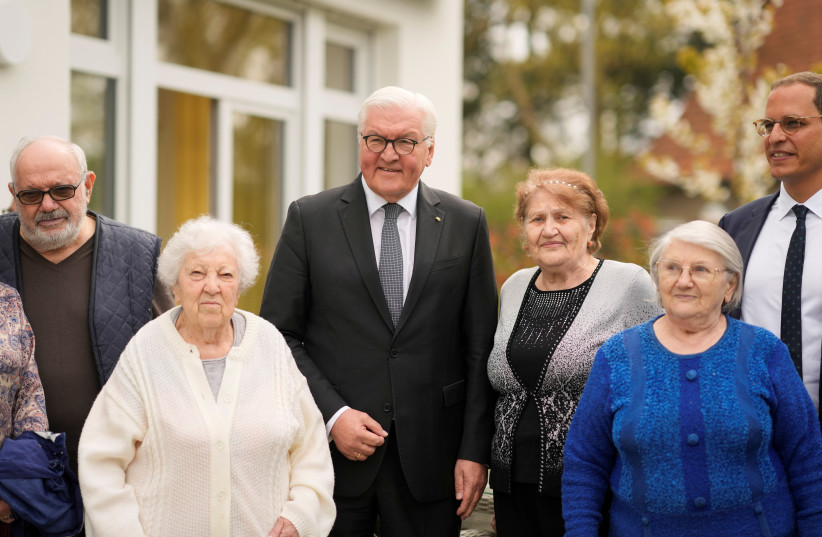MUNICH – About 5,000 Jews have immigrated to Germany from Ukraine since the Russian invasion in February, according to a senior federal government official.
“We have an estimate that about 5,000 Jews from Ukraine have immigrated to Germany since the war broke out,” Dr. Felix Klein, the federal government’s commissioner for Jewish life in Germany and the fight against antisemitism, said in an interview with The Jerusalem Post.
Germany's refugee intake
Germany was accepting Jewish refugees from Ukraine just as it did after the fall of the Soviet Union in the early 1990s, he said during the annual convention of the Conference of European Rabbis.
“Some groups [of Jews] wanted to come to Germany – at the time, East Germany,” Klein said. “The East German government was still in place, but the democratically elected government welcomed the initiative [of accepting Jewish refugees], saying, ‘This is a good opportunity for us.’”
"Till then, they've never faced the horrors of the Holocaust to acknowledge or to do something for the Jewish community," he said. "So the Eastern government worked out an immigration program for Jews coming from the former Soviet Union, which was continued by the united Germany."
Dr. Felix Klein, the Federal Government Commissioner for Jewish Life in Germany and the Fight against Anti-Semitism

“Until then, they’d never faced the horrors of the Holocaust to acknowledge or to do something for the Jewish community,” he said. “So the East German government worked out an immigration program for Jews coming from the former Soviet Union, which was continued by the united Germany.”
Jewish refugees from Ukraine have a different status than other refugees accepted in Germany, Klein said, adding that they actually have more rights.
“The difference is that they can start to work right away,” he said. “They have working permits right from the beginning.” Being a Jewish refugee in Germany “is a privileged position, compared to other asylum-seekers,” because of the painful historic connection.
In a larger European context
Germany has yet to receive a wave of asylum-seekers from Russia as Israel has, but Russian citizens are starting to be interested, Klein said.
“Our embassy in Moscow receives many requests from people who wish to come, but there’s not yet a big wave we can speak of,” he said.
The process for Jewish refugees is different in that they can apply for citizenship through the offices of the Jewish community, Klein said.
“What’s really fantastic is that all the administrative procedures necessary can be done within the Jewish community, so people don’t have to go to an office of the state,” he said. “Luckily, we have many people in our Jewish communities who speak Ukrainian or Russian, so it’s very, very good for them.”
The German government is not actively trying to bring Ukrainian Jewish refugees to Germany, but it is working on the rescue of Holocaust survivors from Ukraine, Klein said.
“We are actively trying to bring Holocaust survivors together with the Claims Conference, the Red Cross and other organizations that give humanitarian aid,” he said. “It’s really moving that 100 people aged 90 and over are coming from Ukraine to Germany. Many of them are Holocaust survivors – people who had to flee the Germans and, at the end of their lives, come to Germany to seek refuge. This is really something incredible.”
An Israeli who has been serving as the rabbi for small Jewish communities in Germany for many years told the Post: “For the first time in many years, I don’t need to beg people to come to synagogue on Shabbat in order for there to be a minyan.
Even small groups of Ukrainian Jews who immigrated to these cities make a huge difference to the communities themselves, he said, adding: “Every small community has a few refugees who have arrived from Ukraine. But when it’s a community fighting for a minyan, this is a big boost.”
Yet there is also a negative side to the situation, the rabbi said.
“On the one hand, it is nice,” he said. “But as an Israeli rabbi, I say it is, unfortunately, a loss for the State of Israel. People who wanted to come to Israel, who dreamed of making aliyah, didn’t succeed and then called me and asked for assistance to bring them to Germany... There is a group of Ukrainian Jews who were trying to make aliyah from Bucharest, Romania. But when it was taking too long, they decided to immigrate to Germany instead.”
The Israeli government and national institutions “aren’t running the operation” the best way, he said, adding that “many Ukrainian Jews have decided to immigrate to other countries” because of the failure of the Israeli government.
“It is a strengthening of the Jewish community in Germany, but a loss for the State of Israel,” he said.
About 11,000 Ukrainian Jews have made aliyah to Israel since the war began.
